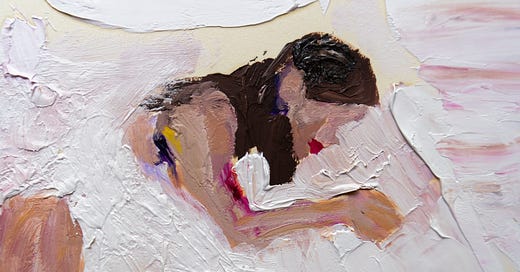As written on July 22nd, 2024
Last week, I attended a poetry open mic in Concord held by the Poetry Society of New Hampshire. When I read my poem—which was new—my whole body shook, my voice shook. I had to read slowly so I could get the words out. It was also the first time I left the house without band-aids on my face, scars out in the open, unquestioned. They aren’t that bad, but they feel alive still. The small but deep wound above my lip is a raw web moving beneath new skin—I’m supposed to protect it from the sun. After the reading, I was told I read well. They asked if I performed. And most heartwarmingly, the organizer asked: “Have you found your poetry community yet, since coming back from Japan?” The poet who read before me was 86. Her poem spoke of civilians murdered, and elephants remembering—knowing. She asks, in a letter to her dead husband, at the poem’s end, “Do you know what dead is?1”
Yesterday, a friend lamented how fear and embarrassment go hand in hand when it comes to accidents. Because accidents are just that, accidents. Teeth biting the bottom of a lake. Last night I dreamt of a giant fire and a sword with two edges. The fire moved when I moved. I woke up when somebody’s voice in my dream said, “It’s time.” I blinked my eyes open in the silence of morning. Just a breath later, a nearby hunter shot their gun four times, and then my alarm clock announced its arrival.
The heat wave has loosened its grip here. And the moon is pregnant with future, which is to say that she carries the past, all nine months of it, even now she carries what she’s seen of genocide.
The day before yesterday, a young man named Salama followed me on instagram. I recognized his profile from seeing his stories shared through Hanin, a Gaza-born Palestinian friend I met in Tokyo at the end of last year. Hanin recently read Salama’s story at a protest outside of Shinjuku Station. From Gaza, Salama watched his words being spoken in Tokyo, thousands of miles away. Friends held his story, made it travel. Story as Poetry, Poetry as Protest, Protest as an “Interruption to Harm.”2 Yesterday, July 21st, was Salama’s mother’s birthday. She died in February because she wasn’t able to receive the treatment she needed to live. Several times, we narrowly escaped death as Israeli forces targeted residential neighborhoods, reducing them to rubble. But one day, my mother grew very tired and collapsed…With no hospitals or medical teams available, our situation was dire. Salama writes.
Forgive me, mother; I tried my best, reaching out to friends, but I couldn't change anything. Sometimes, I feel utterly useless. But I promise you, my heart, I'll stay strong like you and love everyone as you did.
We must hold his words, and the words of others who haven’t been able to write or speak them. Please share Salama’s story with someone you know. Tell them how his words traveled from Palestine to Tokyo. How now you carry them too, everywhere, like the moon.
I made a very small donation of ten dollars to Salama and his family. But donations aren’t the resource I can readily give. So, instead, I try to give my time, and my words. We all have different roles and resources. Consider making a donation to Salama and his family. And if you are unable to contribute in this way, I encourage you to read his story here, and to share it with those who may be able to.
Donate to Yasmin’s fundraiser to help her family get out of Gaza
Read Yasmin’s story, titled : Through the storm
Read a previous Swallow entry : Avenues 道のこと
Purchase an art print for Gaza
I am paraphrasing what I remember of her poetry reading. When I’m able to find her poem / poetry book, I hope to share it here on Swallow.
“Interrupted harm,” in a paragraph about accountability, from Hala Alyan in her essay, Do campus protests show Americans’ support for Palestinians has reached a turning point?





very moving